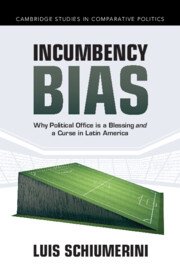Book contents
- Frontmatter
- Dedication
- Contents
- Figures
- Tables
- Acknowledgments
- 1 The Puzzle of Incumbency Bias
- 2 Bounded Accountability
- 3 Too Big to Succeed
- 4 Commodity Shocks and Incumbency Disadvantage in Rural Brazil
- 5 When Capacity Meets Authority
- 6 With Narrow Scope Comes Great Advantage
- 7 Microfoundations of Incumbency Bias
- 8 Incumbency Bias and Democracy
- Appendices
- References
- Index
- Cambridge Studies in Comparative Politics
7 - Microfoundations of Incumbency Bias
Evidence from Survey Experiments
Published online by Cambridge University Press: 17 May 2025
- Frontmatter
- Dedication
- Contents
- Figures
- Tables
- Acknowledgments
- 1 The Puzzle of Incumbency Bias
- 2 Bounded Accountability
- 3 Too Big to Succeed
- 4 Commodity Shocks and Incumbency Disadvantage in Rural Brazil
- 5 When Capacity Meets Authority
- 6 With Narrow Scope Comes Great Advantage
- 7 Microfoundations of Incumbency Bias
- 8 Incumbency Bias and Democracy
- Appendices
- References
- Index
- Cambridge Studies in Comparative Politics
Summary
Chapter 7 employs original survey experiments to test the theory’s microfoundations. The experimental settings display wide variation in incumbency bias and the designs balance the tradeoff between abstraction and control. The results are consistent with bounded accountability: citizens process information about fiscal shocks in a rationally. In Brazil, when the hypothetical nature of the scenario deprives them of prior information about candidates, citizens only respond to information about a fiscal windfall when it is effectively deployed in their district. In Argentina, where the scenario is real and citizens thus hold prior views about incumbents, citizens react according to the predictions of rational updating – that is, improving low evaluations when they learn that incumbents have high responsibility and downgrading evaluations after being told that incumbents have access to external resources. The Brazil experiment also provides evidence consistent with a key assumption of bounded accountability: when given the opportunity, citizens substitute exogenously driven performance for more informative shortcuts – such as party labels and programmatic differences.
Keywords
Information
- Type
- Chapter
- Information
- Incumbency BiasWhy Political Office is a Blessing and a Curse in Latin America, pp. 164 - 190Publisher: Cambridge University PressPrint publication year: 2025
